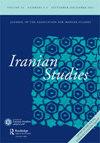苏联对冷战初期伊朗总理哈吉·阿里·拉兹马拉遇刺事件的看法
IF 0.9
4区 社会学
Q2 AREA STUDIES
引用次数: 0
摘要
本文利用在俄罗斯国家社会政治历史档案馆中发现的苏联外交部文件,试图揭示1951年哈吉·阿里·拉兹马拉被暗杀背后的人的身份及其原因。为了寻求一个力量来支持他成为伊朗统治者的愿望,拉兹马拉在苏联和美国之间跳跃,最终把赌注押在了苏联身上。尽管如此,美国并不急于除掉他;相反,他们更愿意利用国王对拉兹马拉的恐惧来确保前者的合作,并从他那里榨取他们想要的东西,尤其是在伊朗的石油特许权。然而,到那时,伊朗已经迅速走向石油国有化,而拉兹马拉反对这一点,理由是苏联应该是为伊朗人生产石油的大国。这对美国人来说是不可接受的,根据苏联的消息来源,他们决定在冷战初期摆脱拉兹马拉。本文章由计算机程序翻译,如有差异,请以英文原文为准。
A Soviet View on the Assassination of the Iranian Prime Minister, Haj ʻAli Razmara, in the Context of the Early Years of the Cold War
Abstract Using Soviet foreign ministry documents found in the Russian State Archive of Socio-Political History, this article seeks to shed a new light on the identity of those behind the assassination of Haj ʻAli Razmara in 1951, and the reasons for it. In seeking a power to back his aspirations to become the ruler of Iran, Razmara hopped between the USSR and the United States, finally gambling on USSR. In spite of this, the United States was not in a hurry to get rid of him; instead, they preferred to use the Shah's fear of Razmara to secure the former's cooperation and to extract from him what they wanted, especially oil concessions in Iran. However, by then Iran was already marching rapidly toward oil nationalization, which Razmara opposed on the grounds that the USSR should be the power that produced the oil for the Iranians. This was unacceptable to the Americans, who, according to Soviet sources, decided to get rid of Razmara during the early stages of the Cold War.
求助全文
通过发布文献求助,成功后即可免费获取论文全文。
去求助
来源期刊

Iranian Studies
Multiple-
自引率
0.00%
发文量
92
期刊介绍:
Iranian Studies is a peer-reviewed journal devoted to Iranian and Persian history, literature, and society, published on behalf of the Association for Iranian Studies . Its scope includes all areas of the world with a Persian or Iranian legacy, especially Iran, Afghanistan, Central Asia and the Caucasus, and northern India, and Iranians in the diaspora. It welcomes submissions in all disciplines.
 求助内容:
求助内容: 应助结果提醒方式:
应助结果提醒方式:


